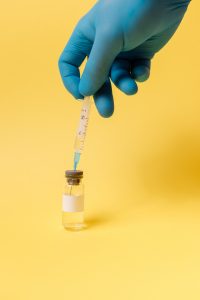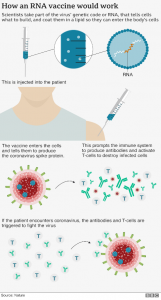How Can We Help?
What are these new mRNA Coronavirus vaccines?

The first two coronavirus vaccines to come down the pipeline, one made by Pfizer and research collaborator BioNTech and the other by Moderna, are both a new type of vaccine called messenger RNA vaccines. Traditional vaccines are made up of small or inactivated doses of the whole disease-causing organism, or the proteins that it produces, which are introduced into the body to provoke the immune system into mounting a response. In contrast, an mRNA vaccine introduces a small snippet of synthetic mRNA into our body to trigger a defensive immune response which then produces antibodies. mRNA is a molecule that transfers information from DNA to the cell machinery that builds different proteins.
For the COVID-19 mRNA vaccines, the mRNA codes for the body’s cells to make a “spike protein” that is found on the surface of the SARS-CoV-2 virus. Once the vaccine is injected into the muscle, the cells start making those pieces and then they are displayed on the surface of the cells and recognized as foreign to the body. At that point, the immune system builds an immune response and makes antibodies, just as it would if you were exposed naturally to COVID-19. Since the protein made is itself harmless, the vaccine does not make you sick, but if/when you are exposed to SARS-CoV-2, your body will be prepared to fight off the infection. It is important to note that the vaccine does not affect your DNA in any way as the mRNA never enters the nucleus of the cell, which is where our DNA is kept, and it is destroyed soon after the instructions are used.
This type of vaccine has been studied before for other infectious diseases such as flu, Zika, rabies and cytomegalovirus, but there are not currently any licensed mRNA vaccines in the US. One of the main benefits of mRNA vaccines is that they can be developed purely in a laboratory in a standardized and scalable fashion, so the vaccine development process can be much faster (about 10 months in this case) than more traditional methods, which often take 10-20 years.
So far the data for the two mRNA COVID-19 vaccines is very promising: Pfizer and Moderna data suggest that their mRNA vaccines are 95% and 94.5% effective, respectively. That said, there is still a lot to learn with this new type of vaccine and there are some potential production and storage problems to overcome as the vaccines are fragile and prone to destruction. Given that initial results have shown the two vaccines to be safe and effective, we at least can continue to hope that we will soon be entering the beginning of the end of this pandemic, but likely the road ahead is still a relatively long one. Read more here.
Jackie Phillips, MD, December 8, 2020



